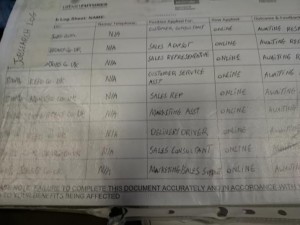I’ve got more to add to this story, which I will do over the weekend – here’s a starter for now:
This is a photo of a timesheet from a London JSA claimant who is on a Community Work Placement at a charity called Embrace UK:
The Community Work Placement scheme is one of this charming government’s we-will-make-you-work-for-nothing “concepts” for people on JSA. Instead of finding people proper paid jobs, the government forces people to work for their tiny benefits for 30 hours a week and for up to 26 weeks in a local charity or organisation. This is workfare, pure and simple.
This claimant is a 44-year-old man who signed on a couple of years ago, because he was not able to cover his bills with the money he was making in a small business he wanted to build (he was self-employed). His work programme provider is Urban Futures. Urban Futures is a right bunch of charmers with a reputation for bullying. The company has recently come to the attention of Boycott Workfare and Haringey anti-workfare campaigners. Urban Futures appears to be delivering Community Work Placements in some sort of contract formation with the equally repulsive G4S. I tried to get hold of Urban Futures on the phone yesterday to ask about the concerns re: bullying, their involvement in CWP, how many people they were sending out to work for nothing in local charities and how much their contracts were worth. I gave up after being passed around to several people who didn’t seem to know what I was talking about and/or didn’t want to know and/or finally said the only person I could talk to was out of the office. I may try calling again next week, or I may just visit their Wood Green offices and lie on the floor in reception until someone responds to me. It’ll be Option B at this rate.
Anyway – the man whose timesheet you see above must work 30 hours a week from Monday to Thursday at the charity on workfare. On Fridays, he goes into a local Urban Futures office where he has to carry out his weekly jobsearch activities. He must apply for about 18 jobs on Fridays. Here’s one of the sheets he recently filled in for that.
So.
Two points for now.
The first is that this man’s CWP commitments are cutting into the time he has available to find paid work and to develop his business, which is what he wants to do. He said that the hours he spends on the workfare placement and in the Urban Futures office “prevent me from building my own business. I think I would have found another job much quicker [if I wasn’t on CWP].”
The second point is that he is involved in quite an amazing range of tasks at the charity and he should get a proper wage for all of it. I think sometimes people who aren’t yet affected by these things have a vague (and snobbish) idea that workfare means a bit of weeding in public parks (a job which, may I say, is a real job that also should be properly paid). I don’t think everyone quite grasps the reach workfare increasingly has, or how far into the workplace the government intends it to go.
This charity provides a range of advice, outreach and support services for people in the area. I spoke to the charity yesterday and the person there confirmed the range of work that people on CWP were involved in – and added that people were also working in data entry and administration.
“I’m involved in the sexual health [advice] team and the youth development group,” the man on CWP told me [a comment which, incdentally, piqued my interest re: CRB/DBS checks. The charity told me that people on work placements were supervised by DBS-checked staff or volunteers at all times when on outreach with young people as per DBS guidance. The ultimate responsibility and enforcement of this is a topic I’m particularly keen to pursue with Urban Futures. It is my understanding that providers are responsible for complying. I wonder how many pursue this tirelessly. I asked the DWP about this, but haven’t heard back. More on that soon]. “At the moment, I’m doing presentations for black history. I do presentations for new arrivals, homeless groups and things like that. I’m involved in the marketing team… You need good IT skills and good communication skills. [You need to be good at] public speaking and any sort of project type management, really. I’m doing all that for the JSA. It’s a lot. ”
Indeed it is. There’s an awful lot of work being done here – for free. Paid work as a concept is under real threat – and that’s paid work of all kinds. As this man said to me when we spoke – people in so-called white-collar work may not be particularly aware that “their” kind of job is being done now for nothing. “They’ll have doctors and lawyers on workfare soon,” he said. I wonder, you know. I could see Iain Duncan Smith getting off on that.

